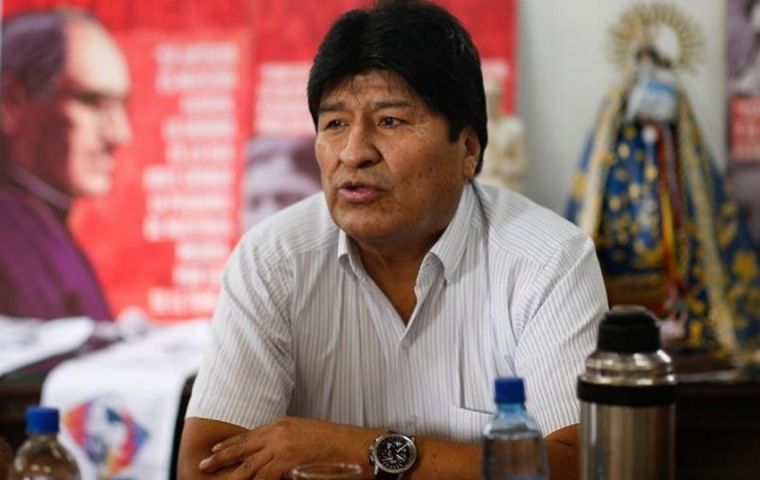MercoPress. South Atlantic News Agency
Peru's Congressional Committee declares Evo persona non grata
 Morales is said to be seeking a way to the Pacific Ocean through Peruvian territory
Morales is said to be seeking a way to the Pacific Ocean through Peruvian territory A Committee within Peru's Congress Monday agreed to declare former Bolivian President Evo Morales a persona non grata for meddling with internal politics, it was announced.
The Foreign Relations Committee approved to “Declare Juan Evo Morales Ayma persona non grata in our country for his negative political activism in Peru and his evident interference and in the political, social and economic agenda of the government of Peru, clearly detrimental to the interests of the Peruvian people; urging the competent authorities to prohibit his entry into our country for these purposes.“
The document maintains Morales visited Peru in July 2021 under the Peruvian Government's protection and services to offer ”ungrateful statements“ that ”warn of his agenda according to foreign interests.”
It also points out that “Morales has been announcing a meeting for December 20 and 21, 2021 in the city of Cusco, under the name of a regional platform called Runasur, without officially knowing the meaning of the sponsorship of national authorities, demonstrating a total lack of respect to the Peruvian people.”
The Renovación Popular (Popular Renovation ) Congressional bloc disapproves of Runasur because “it would be part of a strategy of the Sao Paulo Forum to dismember Peru.” Hence the motion to Morales a persona non grata, which was passed Monday.
According to PR, the Dec. 20 and 21 convention in Cusco “is a part of Evo Morales' geopolitical strategy to dismember southern Peru, northern Chile and create ‘the great homeland’,” which would, in turn, be the goal of the Sao Paulo Forum.
The Peruvian MPs said Runasur sought to replace the Peruvian Macrosur, which includes the Apurímac, Arequipa, Ayacucho, Cusco, Madre de Dios, Puno, Moquegua, and Tacna regions and “in the medium term link them to Bolivia and the north of Chile to obtain its long-awaited access to the Pacific Ocean.”
Additionally, it is said that as part of the creation of the “great homeland”, the installation of constituent assemblies that legalize multinationality is being promoted. The objective would be ”to build an economic unit rich in mineral resources and fertile lands on the coastal coastline with access to international markets.“ Finally, the alleged link to drug trafficking of Bolivian coca growers ”who today seek to spread in Peru“ is rejected.
A previous motion to declare Morales Ayma persona non grata put forward Aug. 19 had been rejected.
Morales had convened regional leaders to the Cusco gathering while in Buenos Aires. ”As Runasur, we approved the Declaration of Buenos Aires in which we reject the interventionist actions of the United States in complicity with international organizations that seek to destabilize democracy of our region and ratify the defence of our sovereignty and natural resources,“ Morales had said through Twitter.
The ”Declaration of Buenos Aires” also states that “The governments or revolutionary peoples that defend the sovereignty of their resources are subjected to economic sanctions, coups that break the democratic institutions and establish policies of racism and fascism to exterminate the peoples.”
“Runasur is the mechanism of plurinational integration between indigenous peoples, Afro-descendants, social, union, territorial organizations and social movements of the region that seeks to resolve the historical debt to the peoples,” Morales had said in Buenos Aires.
Runasur is conceived to take over from the dismantled Unasur created in 2008 under the influence of the late Venezuelan President Hugo Chávez, and supported vy Brazil's Luiz Inácio Lula da Silva, Argentina's Néstor Kirchner, Ecuador's Rafael Correa, and also Morales.
The crisis in the organization began in 2017 when the twelve member states could not agree on a new secretary-general, a situation that was aggravated by the conflicting positions on the Venezuelan crisis. The situation became critical when in April 2018 Argentina, Brazil, Chile, Colombia, Paraguay and Peru suspended their participation and financing.




Top Comments
Disclaimer & comment rulesCommenting for this story is now closed.
If you have a Facebook account, become a fan and comment on our Facebook Page!